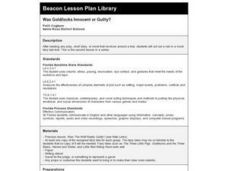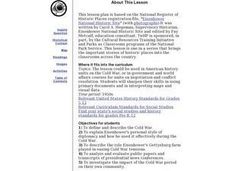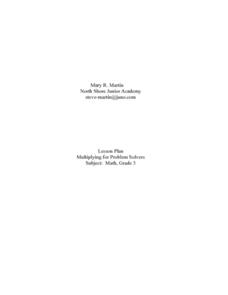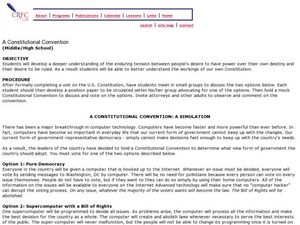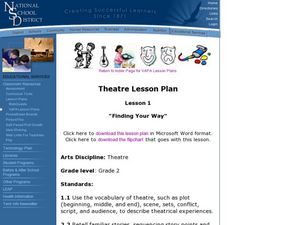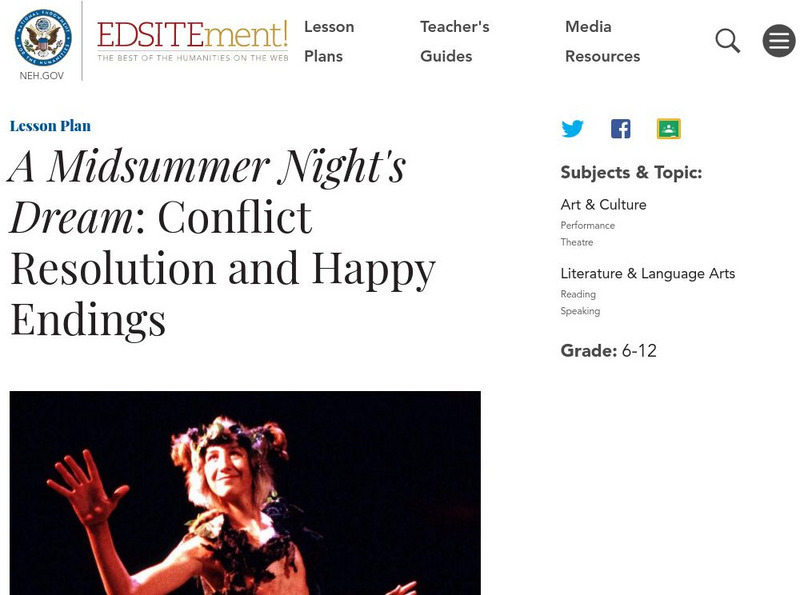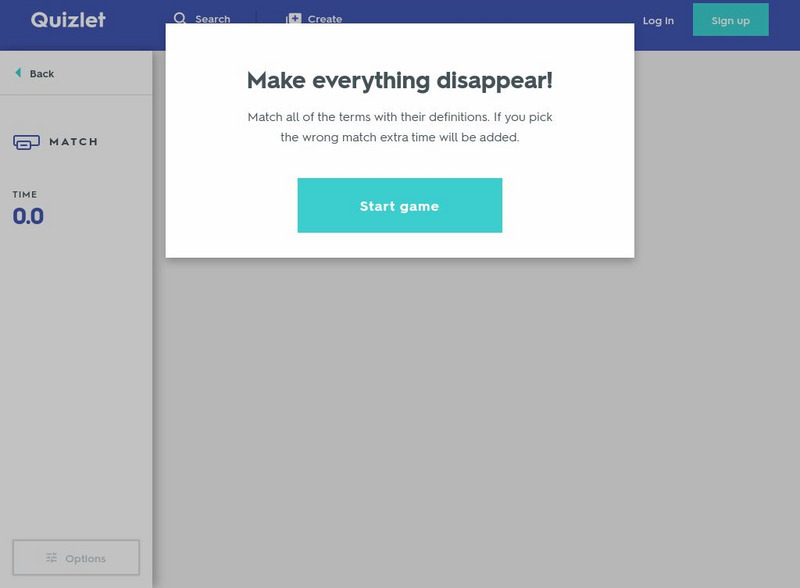Curated OER
Bill of Rights
US history classes explore constitutional rights as they relate to court cases involving teens. Your class must already be familiar with the Bill of Rights before beginning this series of exercises. In preparation for a debate-style...
Curated OER
The Importance of Plants to Native Cultures in the Past and Present
Eighth graders investigate the founding and history of Sluice Boxes State Park. They use both primary and secondary resources to collect data. The focus is upon the use of native plants to make medicines. They write reports about several...
Curated OER
Civil Rights and Americans with Disabilities
Students apply the principles of American democracy to people with disabilities. They analyze how individuals and groups in American society have struggled to achieve the liberties and equality promised in the principles of American...
Curated OER
Small Group Counseling
Students are introduced to the concept of self-esteem and discuss how it is important in friendships. In groups, they counsel one another to determine how one's personal behavior affects the others in their group. They discover the...
Curated OER
Silly Story Starters
Fifth graders brainstorm some ideas for each of the columns. As they call them out, write some on the sticky notes until each sticky note is used for each column They stay in the same groups; have each group draw one sticky note from...
Curated OER
Multiple Perspectives on the Korean War
Learners interpret historical evidence presented in primary and secondary resources. In this Korean War lesson, students examine and analyze primary sources regarding U.S. involvement in the Korean War.
Curated OER
Was Goldilocks Innocent or Guilty?
Fourth graders act out a mock fairy tale trial. They use a fairy tale like "The Three Little Pigs", "Goldilocks and the Three Bears", "Hansel and Grete"l, and/or "Little Red Riding Hood".
Curated OER
Improvisations
High schoolers perform improvisations in front of their classmates. They have no time to prepare. The object is spontaneity. Their roles and situations are given to them on the spot and they have to react immediately. Students...
Curated OER
To Join or not to Join the League of Nations - That is the Question
Students evaluate the possible reasons the United States did not become part of the League of Nations. In this World History lesson, students discuss the pros and cons of what might have happened if the United States had joined the...
Curated OER
Eisenhower National Historic Site
Pupils complete a variety of activities that go along with the study of and possible fieldtrip to the Eisenhower National Historic Site in Gettysburg, PA.
Curated OER
Math: Creating Problems on Computers
Third graders, in pairs, create math story problems on computers. Skills include multiplication or addition and subtraction in two-step problems. After devising their problems, 3rd graders type them and use pictures to illustrate them....
Curated OER
Thaw in the Cold War: Eisenhower and Khrushchev at Gettysburg
Young scholars discover how President Eisenhower's brand of diplomacy at this Pennsylvania farm temporarily eased the tensions of the Cold War.
Curated OER
World War II History Textbooks Project
High schoolers, in groups, research and compare how events of World War II are treated in various countries' school textbooks through linking with another classroom from that country.
Curated OER
A CONSTITUTIONAL CONVENTION: A SIMULATION
Young scholars discuss two computerized options to change the current U.S. government. In this Constitutional Convention instructional activity, students write a statement advocating for one of the choices and participate in a mock...
Curated OER
Theatre Lesson Plan: Finding Your Way
Second graders identify story elements in familiar stories from their lives. For this story elements lesson, 2nd graders act out familiar activities by following directions. Students read a story and discuss the story elements. Students...
Curated OER
Using Visual Art to Create Scenes
Students review scene structure and the elements beginning, middle and end. They view a piece of art to stimulate an idea for a improvised scene. Students work in small groups, create and then perform their scenes for the rest of the...
Curated OER
I Didn't Do It! (Is Anyone guilty Anymore?)
Students explore the concept of "reasonable doubt" in our criminal court system and compare it to "preponderance of the evidence" in the civil court system. They discuss the trials of OJ Simpson and other historical criminal defendants.
National Endowment for the Humanities
Neh: Edsit Ement: Shakespeare's a Midsummer Night's Dream: Conflict Resolution
In this lesson plan, students will consider William Shakespeare's A Midsummer Night's Dream: Conflict Resolution and Happy Endings. Worksheets and other supporting materials can be found under the Resources tab. The activities in this...
PBS
Pbs Learning Media: Arthur: Conflict Resolution
Use role-play to set up and resolve conflicts, in this activity from Arthur.
PBS
Pbs: Role Play How to "Make Up"
Develop conflict resolution skills as you role-play how to "make up" after a disagreement. Write an ending to a story about a conflict that demonstrates postive ways to show you're sorry and explore how conflicts make you feel.
PBS
Pbs Learning Media: Daniel Tiger's Neighborhood: Life's Little Lessons: Friendship
Just like Daniel Tiger and Miss Elaina, the children in your classroom are still learning how to be a friend, how to compromise, and how to work together to solve a problem. By seeing how Daniel Tiger and Miss Elaina work out their...
PBS
Pbs Learning Media: Arthur: Making Up
Explore ways to resolve conflicts between friends. Use role-play and discussion to help children develop conflict resolution skills.
Quizlet
Quizlet: 8th Grade Literature: Unit 1: Plot and Conflict: Match
In this interactive game, students match the 16 vocabulary words related to plot and conflict with their definitions. Students have to play the game multiple times to see all 16 words.
Northern Virginia Community College
Introduction to Theatre Plot
This site contains, in outline form, Aristotle's "six parts of a tragedy." The Plot is discussed in length on this site. The author goes into the exposition, conflict, climax, and resolution of the plot.








